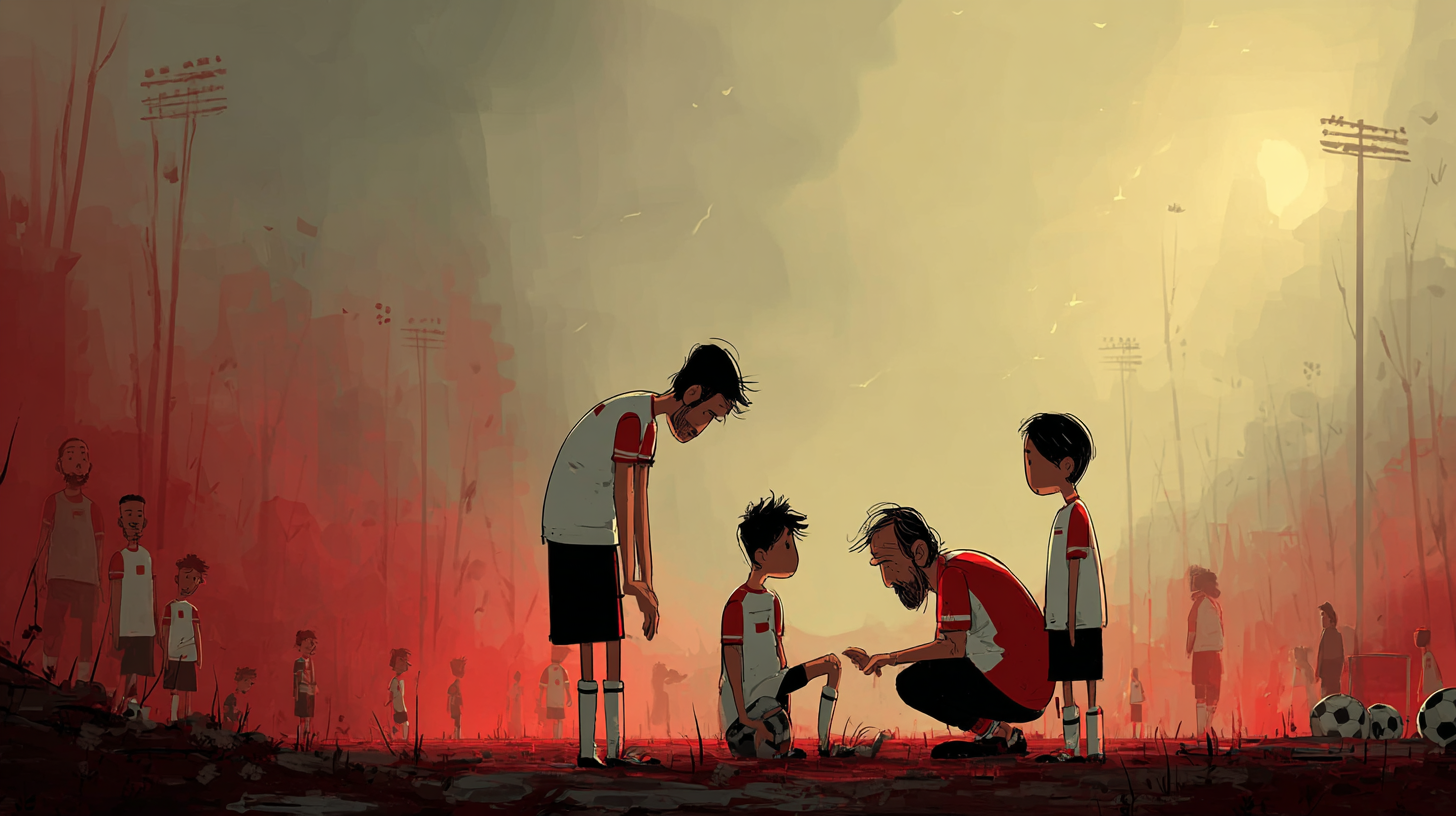Injury means a hurt to the body.
injuryは「けが」を意味する単語です。
以下は英単語 “injury” に関するストーリー型学習コンテンツです。まずは大枠の意味を理解して最後の文章で確認しましょう。
主な意味(main meaning)
| 品詞 | 発音記号 | 意味 | 英語例文 |
|---|---|---|---|
| 名詞 | /ˈɪn.dʒər.i/ | けが、損傷 | He couldn’t play soccer because of a knee injury. |
語源(etymology)
「injury」はラテン語 injuria(不正、害)から来ており、「害を与えられたこと」が語源的イメージです。そこから「体に与えられた害=けが」という意味になりました。
類義語(synonyms)
| 類義語 | 意味 | 例文 |
|---|---|---|
| wound | 傷 | The soldier had a deep wound on his arm. |
| harm | 害 | Smoking can cause serious harm to your health. |
| damage | 損害、ダメージ | The car had damage after the accident. |
| bruise | あざ | She got a bruise on her leg after falling. |
反義語(antonyms)
| 反義語 | 意味 | 例文 |
|---|---|---|
| health | 健康 | Good sleep is important for your health. |
| safety | 安全 | The company cares about the safety of its workers. |
コロケーション(collocations)
| コロケーション | 例文 |
|---|---|
| serious injury | He suffered a serious injury in the accident. |
| prevent injury | Stretching can help prevent injury. |
| head injury | The cyclist was hospitalized with a head injury. |
| injury risk | This sport has a high injury risk. |
2項表現(binomials)
| 2項表現 | 例文 |
|---|---|
| health and safety | The company follows strict health and safety rules. |
| aches and pains | After the marathon, she felt many aches and pains. |
英語ストーリー(english story)
Title: The Unexpected Injury
James was an active young man who worked in an office during the week and played soccer with his friends every weekend. One Saturday afternoon, while running quickly to score a goal, he suddenly fell and twisted his ankle. At first, he thought it was just a small problem, but the pain grew stronger, and soon he realized it was a real injury.
His teammates helped him sit down. One of them said, “It might be a serious injury. You should not move.” Another friend quickly called an ambulance. At the hospital, the doctor examined James carefully. “It’s not broken,” she said, “but you do have a bad injury. You will need to rest for at least four weeks.”
James was disappointed. Soccer was his favorite activity, and he felt unhappy to stop. But the doctor explained that if he played too soon, the injury could become worse and cause long-term harm.
During his recovery, James read many articles about health and safety in sports. He learned about the importance of warming up to prevent injury. He also read about the injury risk of different sports. Some, like rugby and boxing, had higher risks, while others, like swimming, were safer.
His friend Sarah visited him one evening and said, “Don’t worry, James. When you come back, you will be stronger.” She also told him about her own experience. “I once had a head injury when I fell from my bicycle. It took time, but I healed. Now I always wear a helmet.”
James thought about her story and realized that many people face injuries, but they can recover with care and patience. While resting, he also noticed small aches and pains in his body that he usually ignored. He decided to change his lifestyle. He promised himself to eat better food, sleep more, and exercise in a safe way.
Finally, after one month, James returned to the doctor. The doctor smiled and said, “You are ready to play again. But remember, always take care of your body.”
The next weekend, James went back to the soccer field. This time, before the match, he stretched carefully and reminded his team about health and safety. When the game began, he felt happy. The injury had taught him an important lesson: health is more important than winning.
和訳
タイトル:思わぬけが
ジェームズはオフィスで働く若い男性で、週末は友達とサッカーを楽しんでいました。ある土曜日の午後、ゴールを決めようと全力で走っていると、突然転んで足首をひねってしまいました。最初はたいしたことがないと思いましたが、痛みが強まり、それが本当のけが(injury)だと気づきました。
仲間たちは彼を座らせて助けました。1人が言いました。「これは深刻なけが(serious injury)かもしれない。動かない方がいいよ。」別の友達はすぐに救急車を呼びました。病院で医者は慎重に診察し、「骨は折れていないけれど、ひどいけが(injury)です。少なくとも4週間は休む必要があります。」と言いました。
ジェームズはがっかりしました。サッカーは彼の大好きな活動だったからです。でも医者は、早く戻ろうとすると、けが(injury)が悪化して長期的な害(harm)になるかもしれないと説明しました。
回復の間、ジェームズはスポーツの健康と安全(health and safety)について多くの記事を読みました。ウォーミングアップがけがを防ぐ(prevent injury)うえで大切であることも知りました。また、スポーツによってけがの危険(injury risk)が違うことも学びました。ラグビーやボクシングは危険が高く、水泳はより安全だと書かれていました。
ある夜、友達のサラが訪ねてきて言いました。「心配しないで、ジェームズ。戻ってきたとき、もっと強くなっているわ。」彼女は自分の体験も話しました。「私は自転車で転んで頭のけが(head injury)をしたことがあるの。時間はかかったけど治ったわ。だから今は必ずヘルメットをかぶっているの。」
ジェームズは彼女の話を聞いて、多くの人がけが(injury)をするけれど、注意と忍耐で回復できることを理解しました。休んでいる間、彼は普段は気にしない小さな痛みや不調(aches and pains)にも気づきました。そして生活を変えようと決めました。より良い食事をとり、十分に眠り、安全に運動することを誓いました。
1か月後、ジェームズは再び医者を訪ねました。医者は微笑んで言いました。「もうサッカーをして大丈夫です。でも、自分の体を大切にしてくださいね。」
次の週末、ジェームズはサッカー場に戻りました。今度は試合の前に入念にストレッチをして、仲間に健康と安全(health and safety)の大切さを伝えました。試合が始まると、彼は幸せを感じました。けが(injury)は彼に大切なことを教えてくれたのです。それは「勝つことより健康の方が大切だ」ということでした。
Q&A
Q: injuryとwoundの違いは?
A: injuryは「けが」全般を広く指し、打撲、ねんざ、骨折などを含みます。woundは特に「皮膚が切れたり破れたりした傷」を意味します。
Q: injuryとbruiseの違いは?
A: injuryはけが全体を指す言葉で、骨折やねんざも含みます。bruiseは「皮下出血によるあざ」に限定されます。
Q: injuryとdamageの違いは?
A: injuryは人や動物の「体のけが」を指します。damageは「物や環境に対する損害」を表すことが多く、機械や建物などに使われます。
Q: injuryとharmの違いは?
A: injuryは目に見えるけがや損傷を指します。harmはもっと広い意味で、「体」「心」「評判」「環境」などに与える害全般を含みます。
Q: serious injuryとhead injuryの違いは?
A: serious injuryは「深刻なけが」という強調表現で、体のどの部位でも使えます。head injuryは「頭のけが」という部位を限定した表現です。
Q: prevent injuryとinjury riskの違いは?
A: prevent injuryは「けがを防ぐ」という行為を表します。injury riskは「けがの危険度」という状況や条件を表します。
Q: healthとsafetyの違いは?
A: healthは「健康状態」、safetyは「安全な状態」を意味します。セットで「健康と安全」という分野全体を指します。
Q: aches and painsはinjuryとどう違うの?
A: aches and painsは「体のあちこちにある小さな痛みや不快感」を表します。injuryはよりはっきりとした「事故や原因によるけが」です。



コメント